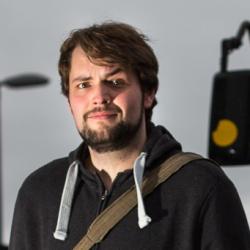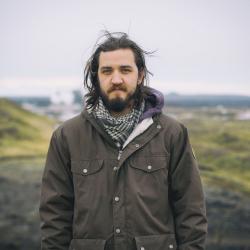Biljana Boloban
Nationality: Serbian
Age: 21
Year of arrival: 2001
Biljana arrived in Iceland with her mother, father, and younger sister, who was five at the time. The family were refugees even in her earliest memories, she says. Thus, coming to Iceland—where they didn’t have to fear for their safety—felt wonderful. She describes in particular the persistent memory of her first Icelandic shower—how amazed she was at the abundance of hot water, and that it didn’t come from a bucket.
Biljana was immediately enrolled into the third grade, which marked the very beginning of her formal schooling. After briefly struggling with the language, she came to her own in upper secondary school, when she moved from Keflavík to the capital area.
She tells us of untold hours acting as the family’s interpreter, mediating at doctor’s appointments and translating every letter that the fledgling household received. She and her family have since made several trips back to Serbia, but happily call Iceland their home. Living in Kópavogur with her boyfriend, Biljana is currently studying to be a social worker and moonlighting at a short-term placement house for special needs children.
On adjusting to life in Iceland
“As a child, whenever I heard sounds that reminded me of explosions I’d run into hiding. Even the sound of a car engine starting would set me off. Needless to say, New Year’s Eve was a horrible time for me, with all the fireworks going off.”
On her self-esteem
“I had a very broken self-image, and a difficult childhood. The other kids had lived very ordinary lives, and nobody understood who I was or what I was going through, so I felt like I was worth less than everyone else. However, my confidence grew the more I understood the language and what was going on around me.”
On being separated from her family
“I remember that when I left Serbia, I was smaller than my grandmother. And when I came back, I had grown quite a bit taller than her, which came as a shock to me, because I’d always envisioned her larger. My grandfather later died while we were in Iceland, and we couldn’t afford to attend the funeral, which I found very difficult. There are so few left of our family, and not having a chance to say goodbye felt rough. Life in another country meant that I always missed someone.”
—
Halldór Nguye
Nationality: Vietnamese
Age: 61
Year of arrival: 1979
Halldór Nguye was 25 when he became one of the first resettlement refugees to arrive in Iceland independently, catching a flight to the country after spending four months in a refugee camp. His first impressions of the country came during the drive to Reykjavík, which to him appeared like the moon’s surface. He initially shared a living space with two other Vietnamese refugees in a three-storey house on Reykjavík’s west side. He says that he wasn’t provided with contacts or resources where he could seek help or information, but did receive a six-month crash course in Icelandic and a job gutting fish.
After studying to become a mechanic, he worked as one for the city for fifteen years before switching fields to work as a translator for the Vietnamese community, even creating a digital IcelandicVietnamese dictionary.
Halldór has visited Vietnam on numerous occasions since relocating to Iceland, and maintains a relationship with his family there through the internet. However, he says Iceland is where he belongs.
On racism
“It existed everywhere in the world, but I didn’t take it personally. Most people were kind and good to me, and I haven’t ever regretted coming here.”
On the Vietnamese community
“When I moved here, there were forty of us living here, and we formed a community of sorts, although some eventually moved to Canada. Now, roughly half of us are left, and we don’t have that much contact with each other. We do run into one another every now and again, of course.”
On his life now
“I wed an Icelandic woman and had three children with her before we eventually divorced. I then married a Vietnamese woman, with whom I have one daughter. We now have four grandchildren. I feel very wealthy.”
Final words
“I just want to thank Iceland for allowing me to come to the country.”
—
Irek A. Klonowski
Nationality: Polish
Age: 70
Year of arrival: 1982
Irek was headed for a skiing holiday in Switzerland with his wife Ewa and their daughter, when martial law was declared in Poland following a surge of massive protests. Rather than returning to the potentially hazardous situation at home, they sought refuge in Austria. Well educated, Irek and his family were deemed highly eligible for refuge—he says an informal enquiry into what Iceland had to offer quickly turned into an unconditional offer of admittance. Two days later, they were on a plane to Iceland.
The family was initially put up in a hotel, as they secured an apartment to let in Reykjavík. Until his retirement, Irek worked as a food processing scientist, while his wife was employed at the national hospital, before moving on to work on individual and mass grave exhumation in Bosnia and Herzegovina (for which she was nominated for a Nobel Peace Prize in 2005, as part of the 1,000 Women joint application).
Irek and his family have since visited Poland many times, and he’s stayed in touch with his brother, who found refuge in Australia. He says that of 26 Polish refugees that immigrated to Iceland in the early ‘80s, his family are the only ones to have remained in the country. When they arrived, Irek says, they enjoyed widespread sympathy from locals who were up to speed on what Poland was going through—in the 21st century, however, the Polish have a different reputation.
He thinks there’s nothing really exciting about his story, maintaining that he and his wife are just ordinary retirees, who enjoy life and meeting their two grandchildren.
On his first impression of Iceland
“It was completely different from what I expected. We came from Austria, where it had been 30°C and sunny—and when we got here, it was 7°C. Everything was green and in bloom in Austria, but not even the Icelandic moss was green when we came.”
On the Red Cross
“We only had the clothes on our back when we arrived, so we had to start over completely. We received some things and furniture from the Red Cross. They planned and executed everything really well, and they assisted us for several months, arranging for our Icelandic courses and such. We were well taken care of.”
On refugees
“I would ask Icelanders to be kind to refugees. It’s incredibly difficult to come to Europe, so please welcome them—society will in the end benefit from it.”
—
Jovana Pavlović
Nationality: Serbian
Age: 22
Year of arrival: 1999
Jovana was six years of age when she came to Iceland with her family, settling in Ísafjörður. She says she had a hard time assimilating—although her family was indeed fleeing the Yugoslav wars, they didn’t arrive in Iceland as formal refugees, and were therefore not afforded the same services and support networks others enjoyed.
She was bullied by her schoolmates in Ísafjörður, making her feel like a secondclass citizen for having a darker complexion and coming from a different culture. However, she later connected with the refugees that came to Iceland, finally feeling a sense of belonging.
Jovana and her family eventually moved to Borgarnes, but she now resides in Hafnarfjörður, and studies political science at the University of Iceland. She says that while the prejudices she experienced as a child have become less prominent alongside Iceland becoming a more multicultural society, she still feels that prejudice is a very real problem in Iceland.
On moving to Iceland
“There was this feeling of insecurity when we were fleeing, this ever-present fear that you never forget. It doesn’t take a lot for me to tear up when I think about it, even though it was many years ago. We came to Iceland seeking security, and that’s it. At first I couldn’t understand why we came here, and it wasn’t until I was fifteen years old that I actually understood that we had escaped a war zone.”
On assimilation
“When people talk about accepting groups of foreigners into their society, it’s not just about the foreigners accepting the society, but the society accepting them back. When we got here people didn’t accept us—rather, they pushed us away. I think that’s a problem in Scandinavia—people aren’t welcoming to outsiders.”
On refugees
“I feel the discussion about refugees often goes along the lines of talking about them as being riddled with problems, but that’s an incomplete picture. There’s never any talk about what their lives were like before that—they’re just reduced to being refugees. I remember when we came to Iceland; our neighbours showed my mother a fridge, like she had never seen one before. Refugees are just regular people in extraordinary situations, people who need help.”
—
See Also:
Welcome To Iceland: A Walk-Through Of The Refugee Arrival Process
When Iceland receives new refugees, the Red Cross plays a crucial and central role. Working alongside the various municipalities and government ministries, their mission starts a long time in advance as they train new volunteers to aid the refugees’ arrival, along with furnishing their new homes, stocking their fridges, helping assess individual needs, and coordinating a support network upon their arrival.
 Case Study: Ísafjörður As Safe Haven For Persecuted Families
Case Study: Ísafjörður As Safe Haven For Persecuted Families
In 1996, the people of Ísafjarðarbær welcomed thirty refugees into their community with open arms. After a period of preparation, six families of mixed Serbian and Croatian marriages from former Yugoslavia arrived to take shelter in the relatively small (pop. 3,500) fishing community in the northern Westfjords, through the combined efforts of the Icelandic state, the Red Cross, and Ísafjarðarbær’s municipal government. Having endured persecution, fear, flight and agonizing uncertainty, the six families were finally home.
 So What’s This I Keep Hearing About Icelanders Welcoming Refugees Into Their Homes?
So What’s This I Keep Hearing About Icelanders Welcoming Refugees Into Their Homes?
Recently, over a thousand Icelanders took to Facebook to pledge their help to those fleeing Syria, with participants vowing to provide food, money, clothes and anything else to help Syrian refugees in need. But even the most cynical person would not be surprised by those kinds of offers. What was surprising, even to optimists, was that a large number promised to take refugees into their homes.
Ísafjarðarbær Mayor: “We Will Gladly Welcome Refugees To Our Community”
“We Have To Do This Together”: Mayor Dagur B. On Acceepting “Hundreds” Of Refugees
Buy subscriptions, t-shirts and more from our shop right here!




















